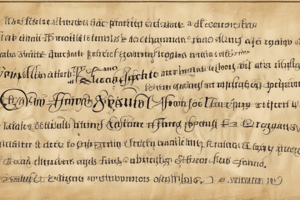Podcast
Questions and Answers
What does 'In principio erat Verbum' mean?
What does 'In principio erat Verbum' mean?
In the beginning was the word
What does 'Et Verbum erat apud Deum' mean?
What does 'Et Verbum erat apud Deum' mean?
And the Word was with God
What does 'et Deus erat Verbum' mean?
What does 'et Deus erat Verbum' mean?
And the Word was God
What does 'hoc erat in principio apud Deum' mean?
What does 'hoc erat in principio apud Deum' mean?
What does 'omnia per ipsum facta sunt' mean?
What does 'omnia per ipsum facta sunt' mean?
What does 'et sine ipso factum est nihil' mean?
What does 'et sine ipso factum est nihil' mean?
What does 'in ipso vita erat' mean?
What does 'in ipso vita erat' mean?
What does 'et vita erat lux hominum' mean?
What does 'et vita erat lux hominum' mean?
What does 'et lux in tenebris lucet' mean?
What does 'et lux in tenebris lucet' mean?
What does 'et tenebrae eam non comprehenderunt' mean?
What does 'et tenebrae eam non comprehenderunt' mean?
What does 'fuit homo missus a Deo' mean?
What does 'fuit homo missus a Deo' mean?
What does 'cui nomen erat lohannes' mean?
What does 'cui nomen erat lohannes' mean?
What does 'hic venit in testimonium' mean?
What does 'hic venit in testimonium' mean?
What does 'ut testimonium perhiberet de lumine' mean?
What does 'ut testimonium perhiberet de lumine' mean?
What does 'ut omnes crederent per illum' mean?
What does 'ut omnes crederent per illum' mean?
Flashcards are hidden until you start studying
Study Notes
Latin Verse Study Notes: John 1:1-7
- Verbum: Latin for "Word"; emphasizes the preexistence and divine nature of Jesus.
- In principio: Latin phrase meaning "In the beginning"; reflects the concept of the origin of time and creation.
- Verbum erat apud Deum: Indicates the intimate relationship between the Word and God; highlights the coexistence of Jesus and God.
- Deus erat Verbum: Asserts the divine identity of the Word, solidifying the theological assertion of the Trinity.
- Hoc erat in principio apud Deum: Reiterates that the Word was with God from the very start.
- Omnia per ipsum facta sunt: Affirms that all creation occurs through Jesus, establishing His role as the Creator.
- Sine ipso factum est nihil: Emphasizes that without Jesus, nothing exists; underscores His essential role in existence.
- In ipso vita erat: States that life is found in Jesus, highlighting the source of spiritual and physical life.
- Lux hominum: Refers to Jesus as the "light of men"; signifies His role in illuminating truth and providing guidance.
- Lux in tenebris: The light (Jesus) shines in darkness, conveying hope and the battle against evil.
- Tenebrae eam non conprehenderunt: Indicates that darkness (evil) fails to overcome the light; reflects the triumph of good over evil.
- Homo missus a Deo: Highlights John the Baptist's divine mission, sent to prepare the way for Jesus.
- Cui nomen erat lohannes: Identifies the forerunner, John, stressing his significance in the Gospel narrative.
- Hic venit in testimonium: John came to testify to the truth about Jesus, fulfilling his prophetic role.
- Ut testimonium perhiberet de lumine: John's purpose was to bear witness to Christ, emphasizing the importance of testimony in faith.
- Ut omnes crederent per illum: Stresses the inclusive message of salvation, that through Jesus, everyone may come to believe.
Studying That Suits You
Use AI to generate personalized quizzes and flashcards to suit your learning preferences.


